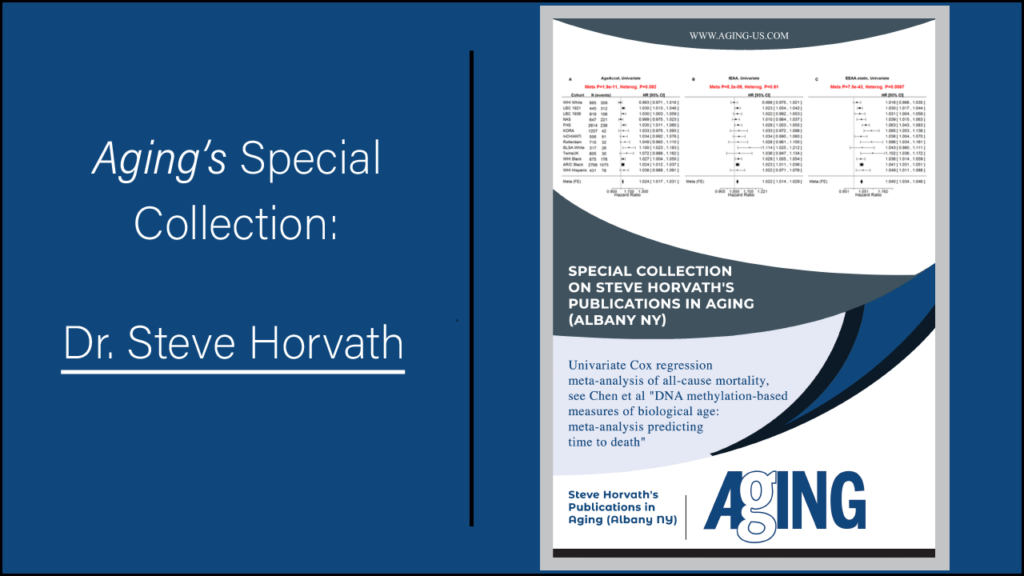Epigenetics is the study of gene expression and the changes that occur which do not involve alterations in the DNA sequence. These changes can occur as a result of environmental influences, including exposure to chemicals, diet and stress. Epigenetic modifications can be passed down through generations and play an important role in disease development. An exciting area of epigenetics research is its role in the aging process. Studies have shown that epigenetic modifications can affect aging and the onset of age-related diseases. Recently, researchers also discovered that epigenetic modifications may be used to measure biological age and aging rate.
Steve Horvath, Ph.D., ScD is a world-renowned researcher, geneticist, biostatistician, and Professor of Human Genetics and Biostatistics at the University of California, Los Angeles. His research areas of study include aging, cancer, cardiovascular disease, HIV, Huntington’s disease, and neurodegenerative diseases. Today, he is well-known for his contributions in epigenetics research. In 2013, Dr. Horvath developed the first multi-tissue DNA methylation-based epigenetic biomarker of aging, known as the Horvath aging clock. Dr. Horvath earned numerous awards for his groundbreaking research, including the Allen Distinguished Investigator award, the Open Philanthropy Project award and the Schober Award. In 2018, 2019, 2020, and 2021, the Clarivate Web of Science Group named him as one of the world’s most influential scientific researchers.
Around the world, research papers published by Dr. Horvath and his teams have been cited by other researchers nearly 80,000 times. Dr. Horvath has currently co-authored 29 research papers published in Aging (Albany NY)/Aging-US. Aging is a twice-monthly, traditional, peer-reviewed, open-access journal covering all areas of research on aging, including age-related diseases such as cancer and COVID-19. To honor his contributions in aging research, Aging recently compiled a Special Collection of research papers co-authored by Dr. Horvath.
Truly enlightening research within this Aging Special Collection includes high-Altmetric scoring papers, such as, “Epigenetic clock analysis of diet, exercise, education, and lifestyle factors,” and, “DNA methylation-based measures of biological age: meta-analysis predicting time to death.” (Watch Aging Interviews with Dr. Horvath published in 2017 and 2022 as he discusses this paper.) The Aging Special Collection on Dr. Horvath’s work also includes research papers on epigenetics in neurodegenerative diseases, such as, “Epigenetic age of the pre-frontal cortex is associated with neuritic plaques, amyloid load, and Alzheimer’s disease related cognitive functioning,” and on groundbreaking anti-aging strategies, such as, “Rapamycin retards epigenetic ageing of keratinocytes independently of its effects on replicative senescence, proliferation and differentiation.” (Watch an Aging Interview with Dr. Horvath published in 2022 as he discusses this paper.)
As a member of the Aging Editorial Board and one of many distinguished researchers who publish their work with Aging, it is an honor to highlight Dr. Horvath’s research with this special collection. His work has inspired many other researchers to develop new aging clocks and to further advance epigenetics and aging research. We highly recommend our readers to pore over the Special Collection on Steve Horvath’s Publications in Aging to gain a comprehensive understanding of his work in epigenetics and aging research.
Read the Special Collection on Steve Horvath’s Publications in Aging.
—
Aging (Aging-US) is an open-access journal that publishes research papers bi-monthly in all fields of aging research. These papers are available at no cost to readers on Aging-us.com. Open-access journals have the power to benefit humanity from the inside out by rapidly disseminating information that may be freely shared with researchers, colleagues, family, and friends around the world.
For media inquiries, please contact [email protected].
